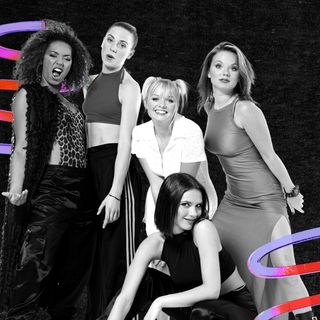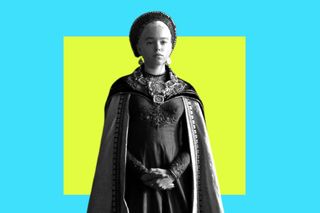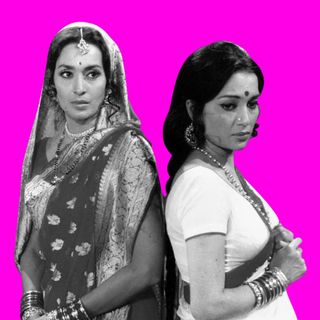
‘House of the Dragon’ Could Either Redeem or Repeat Fantasy Genre’s Girlboss Heroine Problem
The series premier ruminates on the meaning of power as it relates to gender — and offers hints of a promise that GoT failed to live up to.

There’s a scene in the first episode of HBO’s House of the Dragon that uses a few words to encapsulate power, gender, and history: “We have royal wombs, you and I. The childbed is our battlefield.” It’s a moment that, at the very outset, tackles a growing problem within fantasy: uncritically turning heroines into girlbosses.
Set 172 years before Daenerys Targaryen’s birth, the Game of Thrones (GoT) spinoff follows the lives of the Targaryen dynasty and its tussle with power, violence, and glory. These have all been masculine pursuits in the fantasy genre. Many screen adaptation of fantasy stories — like Wheel of Time, for instance — have tried to correct the sexism, but have inadvertently resorted to lazy interpretations of feminism with girl boss heroines. They’re replete with showing, not telling, how women in these worlds do powerful magic and slay enemies just as well as men do — without teasing out the complexities of what it would mean for women to wield power in a masculine space.
It may be too early to tell whether House of the Dragon will subvert this trope or not — but its credibility moving forward may depend on it. The first episode is fixated solely on exploring masculinity, power, violence, and how gender operates within this setting. Arguably, its whole thesis is in setting up the main character, Rhaenyra Targaryen, as a woman who finds herself in a game of power whose rules were made by men. How she grapples with this makes up the rest of the show’s whole dramatic tension — which is what makes the trope itself loom over it like a ghost of failed adaptations past.
House of the Dragon thus has a pressing problem to confront head-on: the depiction of feminism in fantasy caricaturing any powerful woman as a girlboss. In the years following the infamous final season of Game of Thrones, many ardent fans of the series continue to express disappointment and heaviness with the way the story they’d been following for over a decade ended. Much of the ire had to do with the character arc of Daenerys Targaryen. There was something different about her character from the start: she cared about people, not just power. Her accomplishments as a ruler in the making included freeing child slaves, sacking corrupt noblemen, protecting the innocent, and constantly weighing the costs of violence with the end — doing the right thing, even if it means breaking with tradition, in contrast to all the other rulers. And the moment that showed us who she could be was when, as Khaleesi of the Dothraki, she urged the men not to rape and plunder conquered villages as spoils of war. All signs of a story that understands the masculinity and violence inherent in power.
But towards its later seasons — especially towards the end — Dany becomes stone-cold, badass, and swoops in on her dragons accompanied by soaring orchestral music that made her a prop more than a person. And so (spoiler alert), when she finally went “mad” in the series finale and lay waste to the city she had so long dreamed of capturing, she contradicted her own position on not wanting to “be queen of the ashes.” The series had well and truly forgotten what made her such a memorable character, and could have well replaced her with her brother Viserys for all the difference it would have made.
While House of the Dragon invokes just Daenerys, she wasn’t the only one to suffer the fate of the hollowed-out, girlboss heroine with no consistent motivation or inner conflict. Sansa and Arya Stark, too, became increasingly soulless as they got more powerful — losing all of the warmth and humanity that once made them formidable players because of, and not despite, these characteristics. But we were meant to view these changes as a good thing: their stories made for compelling scenes that sated our bloodlust against loathed villains. But these depictions never provided a chance to engage more meaningfully with what it means to be woman grappling with power in a masculinist realm of power struggles.
Related on The Swaddle:
These depictions imply that to be worthy of respect and admiration, one must lose compassion, nurturance, or any regard for humanity — something that undermines their own endeavour to be more feminist. The way that women overcome the oppression of their gender is by renouncing it entirely, shaping themselves after the men who were, in the first place, responsible for making the world so hostile and unfree for women. And this, ultimately, is framed as feminist liberation — leading the fantasy genre to fall into the same trap it set out to fix.
In House of the Dragon, there are mixed signals as to whether the series will reckon meaningfully with power and gender without the girlboss trope. Rhaenyra Targaryen is ostensibly the Dany of this series — she possesses signs of both the feistiness and the compassion of Daenerys. She rides dragons with ease and fosters quiet resentment for her sidelining as the throne’s heir due to her being a girl. But the episode ends with a look of quiet trepidation upon being bestowed the heavy and inescapable fate of Queendom in the future.
Here is where her mother Aemma’s words resonate: they, along with the episode’s montage between the violence of childbirth and pointless fighting, show where the lines of power are drawn when it comes to gender. Women aren’t meant to hold power in the same way as men; their roles, historically defined, have been to ensure the lineage of power without actually having it. It’s obvious in the episode that Queen Aemma’s power to bear children isn’t even hers, as her agency is taken from her by force. “This first episode is divided into women’s realms and men’s realms, and the two rarely overlap,” notes Vulture. House of the Dragon sets up a storyline that could subvert how fantasy’s (and even fairytales’) girlboss problem, which recasts women as action figures rather than characters with depth, just to portray empowerment.
There are questions that this episode sets up that already pave the way toward a better tradition of storytelling about women and power in fantasy: what will Rhaenyra do with a power that’s bestowed on her as a last resort? How will her mother’s words about the different battlefields shape her own future? What does blood, sacrifice, and glory look like for a woman who was never meant to inherit a legacy?
If Dany’s end was heartbreaking for how it didn’t feel true to the character, Rhaenyra could be the antidote to the betrayal, providing some closure for the meaninglessness with which women in fantasy have increasingly started to be written. Her arc will likely provide redemption for the tragic end of her future descendant or will be shown to seal her fate as a doomed girl boss centuries later.
Rohitha Naraharisetty is a Senior Associate Editor at The Swaddle. She writes about the intersection of gender, caste, social movements, and pop culture. She can be found on Instagram at @rohitha_97 or on Twitter at @romimacaronii.
Related


Woe Is Me! “My Best Friend Only Posts Unflattering Pictures of Me. Do I Confront Her?”
